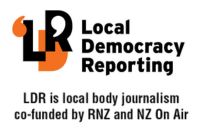Ashburton council pushes for four-year terms

One Ashburton councillor believes a shift to four-year terms would "work better for the ratepayer".
The Ashburton District Council supports a shift to four-year terms if it is for both local and central government.
The only issue is that draft legislation enabling a four-year term is for Parliament only - not councils.
If passed, it would extend the maximum term of Parliament from three to four years if certain conditions are met.
Ashburton Mayor Neil Brown said that if one changes, they both need to change.
That was the tone of the council’s submission, emphasising the importance of the parliamentary term being a fixed four-year period that is matched by local government.
First-term councillor Richard Wilson said he learnt it takes “six months to get council started” after an election and now supports a move to a four-year term.
“You actually lose a lot of time getting ready and slowing down [for elections].
“If we get another year in the middle, that would make council business a bit more streamlined and work better for the ratepayer.”
Council chief executive Hamish Riach said that if central government moved to four-year terms and local government remained at three, the elections would occur at the same time every 12 years.
He said the local election would be “swamped by the coverage of the national elections”.
“We don’t think that is good for local democracy”.
If both central and local government moved to four-year terms, there would be separate elections two years apart.
The councillors approved the submission on April 16, a day before submissions on the draft legislation closed.
Ashburton’s stance is in line with what Local Government NZ (LGNZ) has been advocating for.
LGNZ president Sam Broughton believed there was a strong case for alignment of council and parliamentary terms.
“A four-year term will support the country to be more efficient with infrastructure planning and delivery, basically doubling the number of effective governance years between elections.”
There is also support outside of local governance with Infrastructure New Zealand chief executive Nick Leggett backing a four-year parliamentary term, “but it must be accompanied by the same shift for local government”.
“This is critical if we want alignment between the two tiers of government, and for them to operate and collaborate effectively.”
Leggett said the draft four-year term bill overcomplicates the debate by introducing conditions that allow governments to choose between three- and four-year terms depending on how select committee membership is allocated.
“What’s needed is clarity.
“We should ask New Zealanders one simple question at the referendum – do they support moving both central and local government to four-year terms?
“That approach gives each level of government the focus it needs, reduces administrative strain, and ensures important local issues are not drowned out by national campaigns.”
By Jonathan Leask

